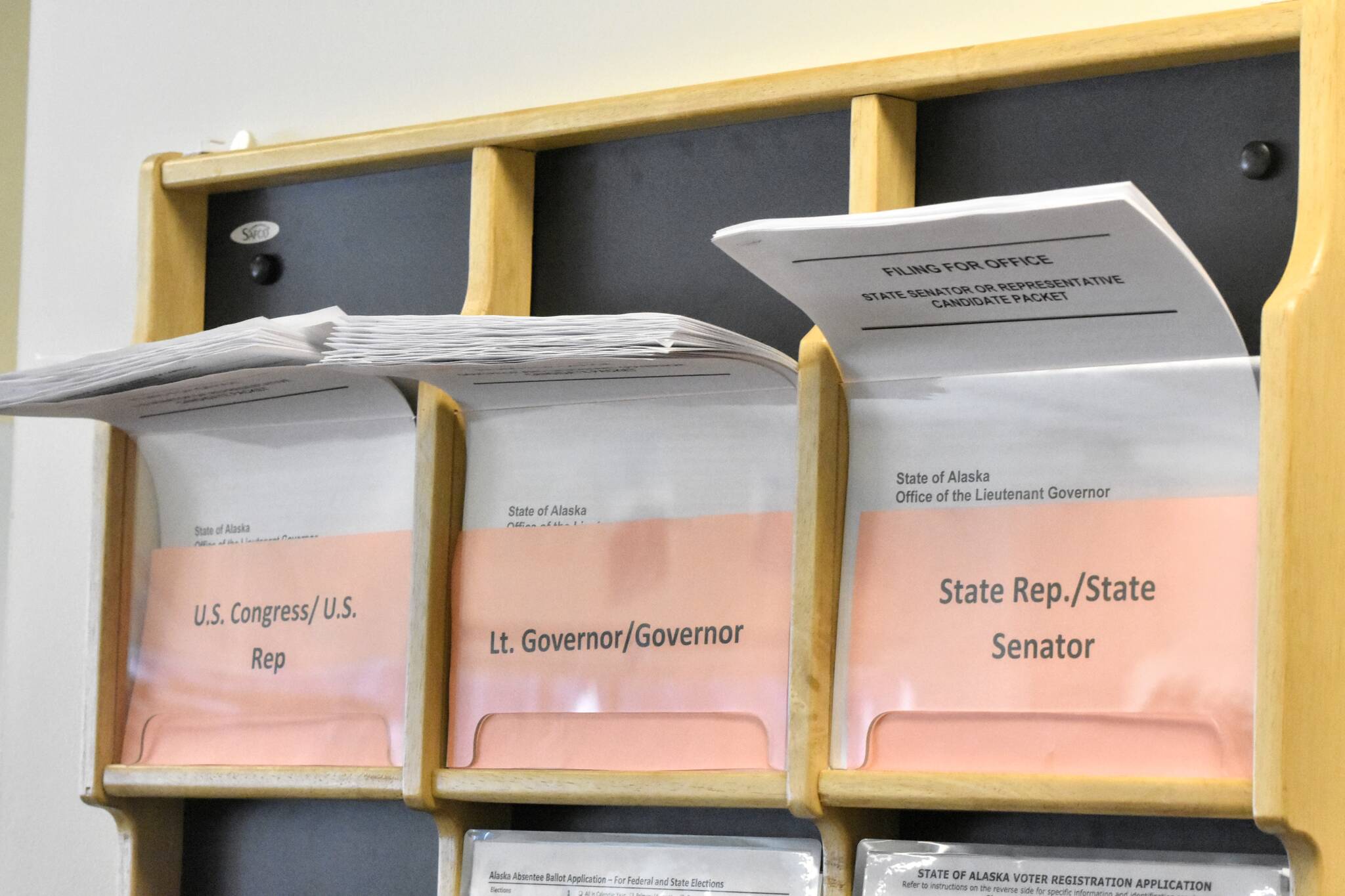Alaskans were already looking at a broad field of candidates for the 2022 elections and as the filing deadline passed at 5 p.m. Wednesday, even more candidates are likely to emerge.
The Alaska Division of Elections was still processing filings at the end of the day Wednesday, according to Brian Jackson, election program manager, but dozens of candidates have already filed, often for the same office.
Jackson said in a phone interview Wednesday afternoon applications had been coming in all day and staff were working to process them. All eligible candidates will have their names posted to DOE’s website Wednesday night, Jackson said.
While there are a notable 48 candidates for the special primary election to immediately replace the late Don Young, there are only 31 candidates have filed to serve a full term as Alaska’s lone member in the U.S. House of Representatives. There are 20 people running for U.S. Senator, including the incumbent Sen. Lisa Murkowski, R-Alaska, who according to the Federal Election Commission has a significant financial advantage over her competitors, including former Department of Administration Commissioner, Kelly Tshibaka, who has been endorsed by former President Donald Trump.
For governor, Alaskans will have 10 pairings of candidates to choose from, including Gov. Mike Dunleavy, a Republican, and his recently appointed pick for a new lieutenant governor, former Department of Corrections Commissioner Nancy Dahlstrom. Other gubernatorial candidates include former Gov. Bill Walker, an independent with former Department of Labor and Workforce Development Commissioner Heidi Drygas and former state lawmaker Les Gara with his running mate Jessica Cook, a teacher.
[Local lawmakers all seek reelection]
Races for the Alaska State Legislature have picked up as well, particularly in Anchorage where a recent redistricting process changed the city’s districts. The redistricting process has been under litigation, with many potential candidates waiting until the final districts were approved before filing for office. But while the redistricting process is still being litigated, an Alaska Superior Court order the board to adopt one of the proposed plans for the 2022 election.
Almost a third of the incumbents in the Legislature have declined to run again, and several members of the Alaska House of Representatives are running for seats in the Alaska Senate.
Reps. Matt Claman, D-Anchorage; James Kaufman, R-Anchorage; Geran Tarr, D-Anchorage; Ken McCarty, R-Eagle River; and Kelly Merrick, R-Eagle River, are all running for Senate seats.
In Juneau, only Rep. Sara Hannan, a Democrat, is facing a challenger. Juneau’s districts changed in the redistricting process as well, and Hannan’s district now includes parts of the Mendenhall Valley and no longer includes the Northern Lynn Canal. Hannan’s district still covers Douglas Island and downtown Juneau, but her district now extends past the Juneau International Airport and is bordered by Riverside Drive and Steven Richards Memorial Drive.
According to DOE, Darrell Harmon, independent, has filed to run for Hannan’s District 4 seat. Harmon did not respond to request for comment.
Rep. Andi Story and Sen. Jesse Kiehl, both Democrats, had no opponents listed by DOE.
This is the first year Alaska will use a new voting system narrowly approved by voters in 2020 which enacted both ranked-choice voting and open primaries. But with the sudden death of Don Young, the new system will get something of a trial run in the special primary election for his replacement. Citing time and personnel constraints, DOE is holding the special primary election almost entirely by mail — though in-person voting is available — with ballots being postmarked no later than June 11 in order to be eligible.
Alaskans won’t actually vote for most candidates until Aug. 16. On that day, Alaskans will vote in open primaries for their state representatives and statewide offices including the governor and U.S. House and Senate seats, but also in a ranked-choice ballot with the top four vote-getters from the June 11 special primary. The winner of the Aug. 16 special election will go on to fill out Don Young’s term until January when the winner of the general election in November is sworn in.
Most of the candidates in the special primary have also filed to run in the general election, though some, including the man who legally changed his name to Santa Claus, are not.
In-person voting
In Juneau, in-person voting is available at the State Office Building on the eighth floor and at DOE’s offices in the Mendenhall Mall.
Hours at both locations are 8 a.m.-5 p.m. Monday-Friday, voting at the State Office Building is available Saturday, June 4, from 10 a.m.-4 p.m. and Sunday, June 5, from 12-4 p.m.
On Saturday, June 11, in-person voting will be available at the State Office Building from 7 a.m.-8 p.m.
For more information visit DOE’s website at elections.alaska.gov.
• Contact reporter Peter Segall at psegall@juneauempire.com. Follow him on Twitter at @SegallJnuEmpire.

